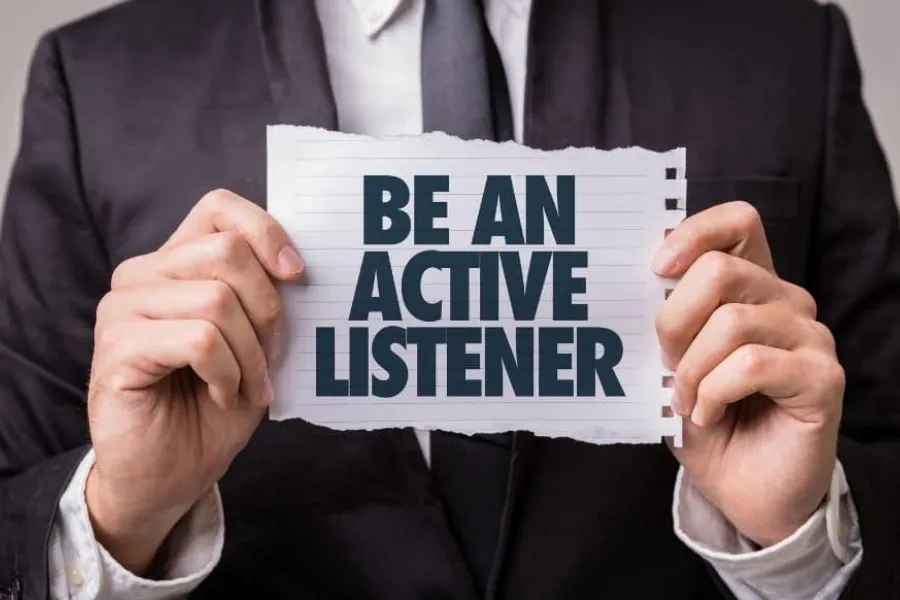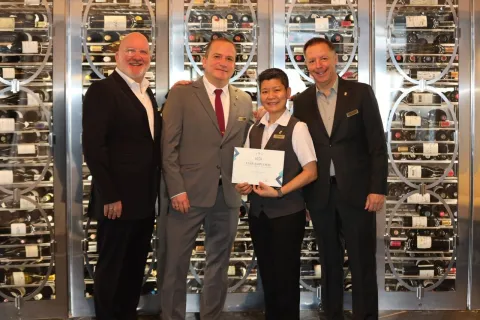
Among many other qualities that crew members can have, listening is one of the most important. We all have things to say. We all tend to complain, talk, and explain how and why things should be done, but only a few can actively listen. Everyone knows how to talk, but only a few people know how to listen actively. When I say listen, I mean actively listening. Showing your fellow crew members that you care with your body language, asking follow-up questions, and showing that you respect your fellow colleagues on the ship. At the end of the day, when we talk, we only repeat what we already know, and when we listen, we have a chance to learn something new.
Listening to people shows kindness as it tells them what they have to say matters. This is especially important when you're at sea and spot someone you work with who might be struggling mentally. Ask them if they want to talk, and listen to what they are saying.
Aside from showing kindness, listening is also crucial when working in a seafarer's job so that commands, instructions, explanations, and orders are understood.
•Thank those you work with
Saying thank you to someone is such a small thing, but it means a lot when it's said with meaning. Being appreciative when the Cook makes a surprise treat or when someone does you a favor will make it more likely that they'll do the same again. Win-win!
•Have proper conversations
It can be so easy to get sucked into your familiar pattern of eat, sleep, shift, repeat that having a real conversation with the people you work with can feel like too much effort.
But put it this way: when you take the time to initiate a conversation, it will benefit both you and the person you are talking to. You learn more about each other, which will help your relationship grow onboard.
•Show consideration for others.
Being considerate is about considering the other person's feelings before you speak or act. Is someone having a hard time onboard? It may be time to hold back on the teasing and see if you can help them in any way.
Is a Cadet struggling to grasp a concept or instruction? Showing a little consideration and accepting that there was a time when you didn't know everything you do now and taking a moment to explain it again could be the difference between being kind and dismissive.
•Give credit where it's due.
If someone you work alongside or above is performing well and you know they're serious about their career at sea, if you're in a position to, tell your superior that you think they're doing a great job.
Singing the praises of someone who genuinely deserves it won't stop you from getting ahead in your maritime career; it will make you stand out as a decent person who likes to see others do well, too.
•Be the one who brings the fun!
You don't need us to tell you that working on a ship is hard. You may be tired, wish there was a way to get a better night's sleep, or want to crash on your bunk at the end of your shift with a movie, but getting people involved in an activity will show your generous spirit.
Shared movie nights, card games, sports on deck, and karaoke give everyone onboard a chance to know one another better. That will help improve communication, create a positive environment, and make it easier for everyone to work together in a highly stressful job.
Why is this kind? Because it shows you care about the well-being of your fellow crew and the productivity and positivity of your vessel.
Why it's important to get along with your fellow crew mates
There are many benefits to getting along with the crew mates you work with on a ship. Here are just a few of them:
You'll be happier
It's not rocket science: When you work with people you like and get along with, even the dullest day at work becomes more enjoyable. The knock-on effect is a naturally more favorable outlook on your job, making you happier overall.
And like we've already said, only some people are going to be your best mate while you're working at sea. Still, even if you don't become Best Friends Forever with everyone onboard, when you make an effort to get along with people, you'll be contributing to a more positive and productive working environment for everyone. (And you might make some long-lasting friendships after all!)
You'll get greater job satisfaction.
This links to the above point, but let's look at it in more depth. When you have pleasant relationships with the people you work with, you're more likely to be satisfied with your job overall.
And when you and your crew mates get along, you're all more likely to be helpful and supportive of one another. This results in stronger teamwork and better communication and collaboration, ultimately improving performance and safety onboard.
You'll have better opportunities for advancement.
Sure, you can take all the seafarer exams you want to. Still, if you're not liked and respected by your fellow crew - particularly your senior officers or Head of Department - chances are you won't be recommended for promotion.
It goes without saying that people want to work with and support someone they like and trust. And especially in the microcosm that is a vessel, your post-contract assessments could be better if you're hard to work with. Even worse, that crew manager might want to hire someone other than you for more positions.
You'll reduce your stress levels.
There can't be many people who actively enjoy working in a negative environment. When you're working in a seafarer's job, which can often be stressful and physically demanding, dealing with a toxic workplace can negatively impact your physical and mental health.
Positive relationships with coworkers can help reduce stress levels and create a friendlier and more pleasant workplace. After all, you need to be focused on your daily tasks onboard - not on dealing with skyrocketing stress.
So that's why it's essential to get along with your fellow crew mates. But the million-dollar question is - how?
If you're not naturally a people person and you'd rather keep yourself to yourself and hunker down in your cabin after your shift has ended, give our reasons on why getting on with everyone (or at least most people!) onboard is beneficial, another read-through.
And if you need a few pointers for getting along with your crew mates better, keep reading.
Tips for getting on better with your crew mates onboard
•Be respectful of everyone, regardless of their position or rank. From the youngest Deck Cadet to the Chief Engineer and Master, everyone works with the same goal.
•Be friendly and approachable. Greet your fellow crew with a cheery smile and a good morning - or a good afternoon or evening, depending on which watch you're on!
•Be open to feedback, especially from your higher-ranking coworkers. Becoming defensive in the face of even mild criticism is a no-no, and it won't help you progress up the maritime career ladder either.
•Be willing to help out when needed. If you're known as someone ready to lend a hand, it will make your working relationships so much better. You might learn something useful, too!
How to improve life onboard your ship
Whatever the cause of your unhappiness, you can take steps to put yourself in a better mood.
But remember - we're not doctors, so if you think what you're experiencing is more like depression, we strongly recommend that you talk to a professional when you're back ashore, as well as someone you can trust on board if you're currently working at sea.
But if you feel like you'd benefit from a quick, uplifting mood fix, here are a few ideas:
•Get a good night's sleep - but if you're struggling, we have some tips for insomniac seafarers here.
•Read some inspirational quotes for seamen - either in English or in Tagalog!
•Learn to communicate better - it will help ease frustrations and help you at work and in your daily life.
•Practice being kind - it will not only help the people around you, but it will boost your mood, too.
•Connect with your fellow crew - play games, organize a competition, hold a movie or karaoke night.
Crew Insights
Articles and experiences shared by crew members working on cruise ship. Find out more about ship life at sea together with tips and advices for first time crew members and cruise oldtimers.












